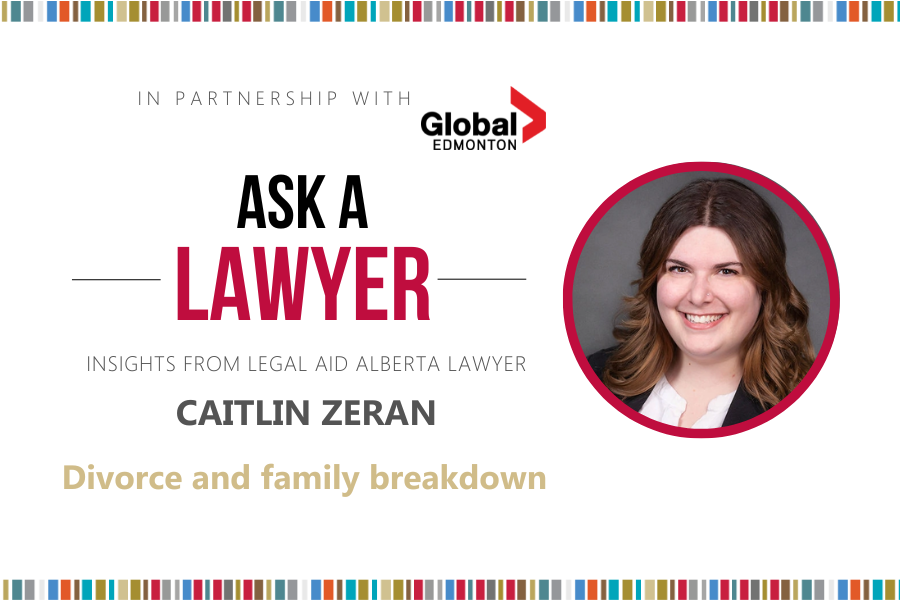LAA lawyer Caitlin Zeran joined Global News Morning Edmonton to talk about the rules of child and spousal support and the common misconceptions of the divorce and separation process.
Each year, thousands of Alberta families are faced with difficult conversations around divorce and family breakdown. For those with limited resources, Legal Aid Alberta offers support for a wide range of family law services, including spousal and child support. On this month’s segment of Ask a Lawyer, LAA lawyer Caitlin Zeran joined Global News to talk about the rules of child and spousal support and the common misconceptions of the divorce and separation process.
Please view the video on the Microsoft Edge web browser.
Transcript of the program:
Erin Chalmers: Divorce is never an easy topic, but every year, thousands of Albertan families are faced with having the conversation. Thankfully, for those with limited resources, Legal Aid Alberta is able to provide a number of services. Joining us this morning to talk more about that is Legal Aid Alberta lawyer Caitlin Zeran. Thank you so much for being here this morning. So when we’re talking about divorce, what types of services does Legal Aid Alberta provide?
Caitlin Zeran: Really the purpose of our organization is to make sure everyone has access to justice and that’s the most part an element of what we do. So for people going through a separation which is arguably one of the hardest things you will ever go through, we do offer everything from divorce, assessing support obligations, child support and spousal support and property division. We deal with what used to be called “custody and access” now called “decision-making authority and parenting time.” We deal with the standard issues but we also offer service where we have lawyers who represent children in high conflict divorces, as well as in child welfare matters. We cover the spectrum in terms of services that we offer for people, and the entire point of the organization is to make sure regardless of somebody’s income or status that they have the same access to resources as everybody else who can afford a private lawyer. One of the ways that we do that actually is by trying to encourage people to settle outside of court because it’s ultimately a lot less expensive, a lot less time-consuming and stressful, generally, and that is something that we try to encourage. I think this something our office is very talented at doing.
Erin: Who can receive legal aid help?
Caitlin: We have a specific guideline for individuals who qualify for legal aid. Generally the clients that we cater to are individuals who are struggling with mental health, addiction, intergenerational trauma and very complicated, high conflict files are generally the things that we deal with at the office. There are thresholds financially for individuals to qualify for services. But ultimately because we’re dealing with a sector of the population that is lower income, that results in us having clients who struggle a lot more with things, like I said mental health and addiction and things like that. So we cater to individuals who are struggling not only with the separation, but also with some serious things in their everyday life, and that is what we target in our work.
Erin: One of the big things with divorces is often child or spousal support, can we talk about that?
Caitlin: The easiest way to differentiate is with child support, it is a little more strict. The child support guidelines tells us based on some income, how much they would need to pay the recipient for however many children they have. That’s called section 3 child support and can vary depending on how much both people make. But if one parent is the primary caregiver, they receive the child support and it’s based on the payer’s income. There is also section 7 child support which are things that are above and basic care. Things like post-secondary education, uninsured medical benefits, anything above and beyond basic care of a child on a monthly basis are a little more strict. With spousal support, they are actually called the “spousal support advisory guidelines” so where the child support guidelines are [guidelines], the spousal support advisory guidelines are meant to give us a range of what someone could potentially have to pay for spousal support, as well as a length of time that they could have to [pay]. It’s not a set number, it is more of a range that lawyers and justices and judges try to work within, which is why it’s important to try to settle, because it keeps the control in your hands as opposed to leaving it up to the court.
Erin: Before we go, are there any misconceptions out there that you want to clear up?
Caitlin: I would say first of all, it is never a great idea to represent yourself in court with family litigation. Unfortunately, that has to happen quite a lot because access to justice can be expensive, so that is something which trying to combat with our services, such as our duty counsel services. We provide help day of court for people who don’t have lawyers. It is not a great idea to represent yourself, even though usually, when that happens there is no other choice. I feel also that our lawyers that work for legal aid are some of the best lawyers I’ve ever had the pleasure of working with. They are very passionate, intelligent and well-spoken people who have been chosen to pursue a path that focuses on providing assistance to most vulnerable population that exists. To me that something to be incredibly proud of, so the misconception that legal aid lawyers may be not as good as private lawyers is not the case at all. I recommend people hire a lawyer if they can, or apply for legal aid, or use duty counsel services because if the law is confusing for lawyers, I can’t imagine how confusing it must be for self-represented people.
Erin: It is such a huge thing going through divorce and there are so many aspects to it. Thank you so much for coming in this morning to chat about this. Legal Aid Alberta lawyers specialize in family law, child welfare, domestic violence, immigration, and youth and adult criminal defence. If you have a question for a lawyer, send it to: communications@legalaid.ab.ca.


